M4U1 复习教学案
M4U1教学设计 【完整版】
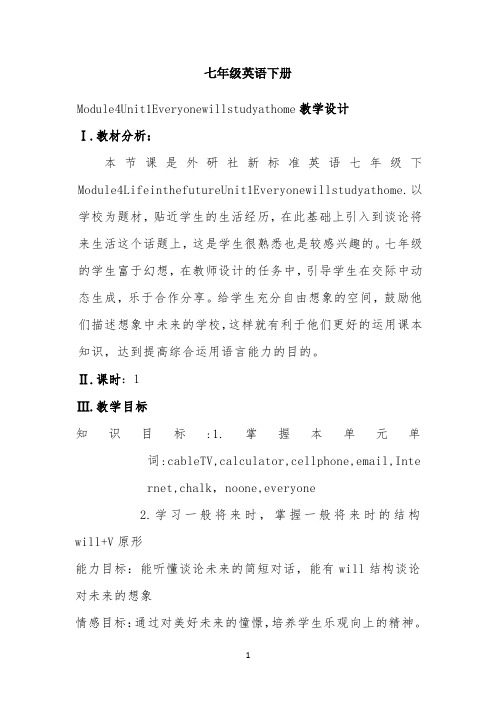
七年级英语下册Module4Unit1Everyonewillstudyathome教学设计Ⅰ.教材分析:本节课是外研社新标准英语七年级下Module4LifeinthefutureUnit1Everyonewillstudyathome.以学校为题材,贴近学生的生活经历,在此基础上引入到谈论将来生活这个话题上,这是学生很熟悉也是较感兴趣的。
七年级的学生富于幻想,在教师设计的任务中,引导学生在交际中动态生成,乐于合作分享。
给学生充分自由想象的空间,鼓励他们描述想象中未来的学校,这样就有利于他们更好的运用课本知识,达到提高综合运用语言能力的目的。
Ⅱ.课时:1Ⅲ.教学目标知识目标:1.掌握本单元单词:cableTV,calculator,cellphone,email,Internet,chalk,noone,everyone2.学习一般将来时,掌握一般将来时的结构will+V原形能力目标:能听懂谈论未来的简短对话,能有will结构谈论对未来的想象情感目标:通过对美好未来的憧憬,培养学生乐观向上的精神。
了解高科技与文化之间的关系,在享受高科技带来的便利的同时,能注意民族文化的传承。
教学重难点1.掌握一般将来时的结构will+V原形能听懂谈论未来的简短对话,能用will结构谈论对未来的想象重点:学习“will+动词原形”结构描述将来要做的事。
难点:熟练准确地运用“will+动词原形”结构谈论将来的生活。
课前准备一、学生自己查找并了解有关一般将来时的语法内容二、学生预习词汇并按照音标朗读,小组解决自己不会拼读的词汇三、预习教材对话,找出对话中表达将来生活的句子课前延伸:教师布置预习新词汇学生预习词汇并朗读电子白板新课导入:1、检查词汇预习展示相关单词的图片学生观看图片并说出单词,然后集体朗读单词利用图片,增加单词学习的形象性。
2、展示新句型(1)freetalk:Whatdoyouusetostudy(2)will句型引入:Whatwillyouusetostudy结合新单词,学生小组讨论并展示句型。
六年级下册M4U1教学设计

本学年是小学生学习英语的第四个年度了,学生们已掌握了一定的听、说、读、写能力,并初步掌握了用英语进行交际的能力;但同时,班级中也出现了严重的两极分化情况。因此,在课堂中,老师应创设教学情境,通过任务型活动的开展,调动所有学生的学习积极性并提高课堂的学习效率。
教学目标
知识目标:1.学生能理解认读:balloon.2.学生能运用句型:The balloons are flying away! Who can help me?Sorry, I can’t. I can help you.3.学生能进一步掌握现在进行时的用法。4.要求学生模仿语音语调,初步达到语调达意。
《英语》(新标准)(小学三起)六年级下册
Module4Unit 1The balloons are flying away!
教材章节及课题
Unit 1The balloons are flying away!
课时
第一课时
课型
新授课
教材分析
本课为新标准英语(三年级起点)第六册Module4Unit1The balloons are flying away!本课承接上一模块,进一步强化复习现在进行时;同时加入了情态动词”can”的运用,旨在教会学生如何表达寻求别人的帮助或给予帮助。
S: The oranges are falling.
The balloons are flying away.
The balloons say,“Happy birthday, Daming!”
4.Read after the tape.
5. What did they say?Read and try to remember.
教学重难点
教学重点
八年级(下)英语课程资源库M4U1教学设计

微课反馈
Step 1udents’learning.
Read the passage of word study.
拓展提高
Step 2 Pre-listening
1.Please guess: What's wrong with ...?
2. How long has the boy been ill?
3. What kind of food does the boy usually eat? .
4. How many pieces of advice does the doctor give the boy?
3.Listen and fill in the blanks.
2.What other illnesses do you know?
Step 3 While-listening
1.Listen and choose the best answers.
2.Listen and answer the following questions.
1.Where are they talking now? .
二、学习目标分析
课前目标:
初步了解看病用语,会朗读。
课中目标:
To be able identifyillnessand theirsymptoms.
To be able to talk about illnesses.
三、学习者特征分析
对话介绍了各种疾病症状的表达方式和医院对话时常用的交际语。学生能够在真实语境中体会到目标语言的应用型,容易缠身学习兴趣和热情。需要创设情境帮助学生运用语言。
3.Pair work: Make a conversation between Daming and the doctor. Daming is ill and he goes to see the doctor.
m4u1教案
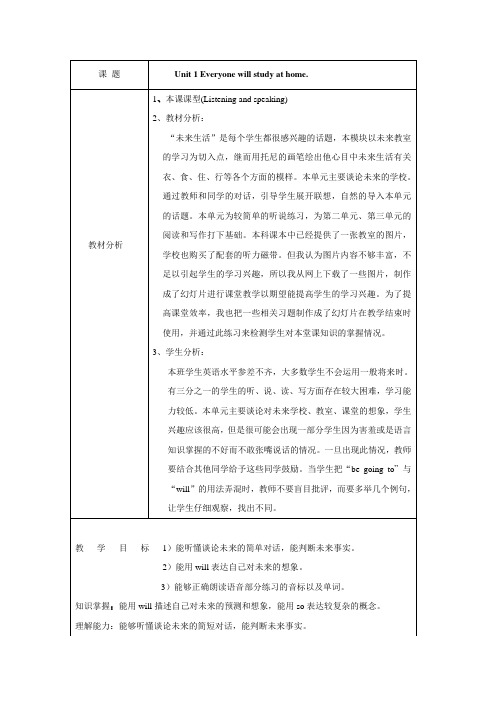
(2) able
(3) level
(4) questions
Step5:Task .Talk about what your school will be like in ten years.
Step5:Homework Review and recite the important points of Unit 1
进一步训 练学生的 口头输出 能力。
板书设计: Unit1 Everyone will study at home Everyone will… Will students…? Yes, they will./ No, they don’t. How will students…? 教学反思: 本课为一节听说课, 教师应鼓励学生描述自己想象中未来的学校, 引导学生在交际活动中有话可说,乐于合作。这样既有利于更好地运用课本 知识,又有利于提高学生的总个语言运用能力。
教 学 方 法 教学过程
: Communicative Approach
教学过程的组成部分
为听对话 做铺垫和
Step 1:Warming up
To give some pictures and videos about the schools in the future to 准备。 students. Let them watch it.
4.Pronunciation and speaking:
1.Listen and mark the stress. And then listen and repeat. blackboard computer eraser Internet telephone
五年级m4u11教案25

Read quickly..
运用卡片快速 记忆单词
5. Check: Read and match. 6. Use the words, read and answer.
Read and match
随讲随练,及 时巩固。
Look , read and compare.
7. Ask and answer in pairs
学情分析
学生对于用水的词组在四年级有了一些基础,同时对水在生活中的用途有了一定了
解,在设计时重点放在句型与词组结合使用方面。
教学重点
能正确使用句型 How do we use water? We use water to...
教学难点
理解 We use water to wash our hands.中 to 与动词词组搭配使用
学习 目标
导入
farmer, useful, grow crops, put out fires.
2.能通过 Listen and say 的情景对话,理解本 单元核心词汇和句型。并能用 We use water to...介绍水的用途。
Read and guess.
It’s water.
Shop the topic: water.
3. Look and learn.
Look and learn..
T: How do we use water? 4. Look and answer.
We use water to wash our hands\wash vegetables\ water clothes.
由浅入深,结 合句型,应用 新词汇。
目标
对应点 目标 1,2
wash clothes
M4U1教案
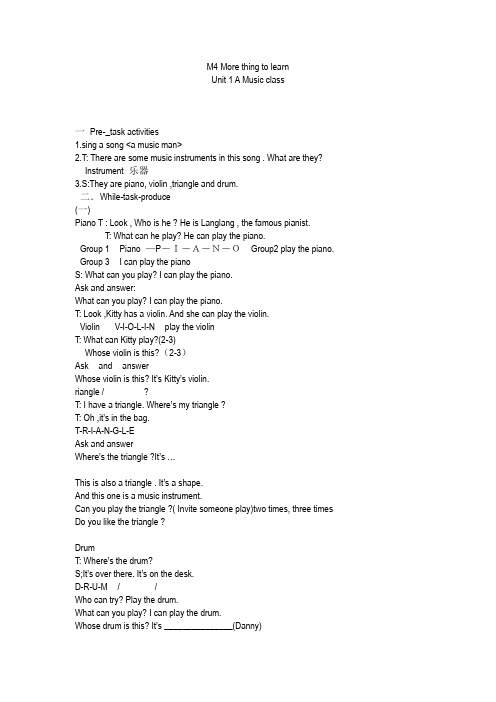
M4 More thing to learnUnit 1 A Music class一Pre-_task activities1.sing a song <a music man>2.T: There are some music instruments in this song . What are they? Instrument 乐器3.S:They are piano, violin ,triangle and drum.二.While-task-produce(一)Piano T : Look , Who is he ? He is Langlang , the famous pianist.T: What can he play? He can play the piano.Group 1 Piano —P-I-A-N-OGroup2 play the piano. Group 3 I can play the pianoS: What can you play? I can play the piano.Ask and answer:What can you play? I can play the piano.T: Look ,Kitty has a violin. And she can play the violin.Violin V-I-O-L-I-N play the violinT: What can Kitty play?(2-3)Whose violin is this?(2-3)Ask and answerWhose violin is this? It’s Kitty’s violin.riangle / ?T: I have a triangle. Where’s my triangle ?T: Oh ,it’s in the bag.T-R-I-A-N-G-L-EAsk and answerWhere’s the triangle ?It’s …This is also a triangle . It’s a shape.And this one is a music instrument.Can you play the triangle ?( Invite someone play)two times, three times Do you like the triangle ?DrumT: Where’s the drum?S;It’s over there. It’s on the desk.D-R-U-M / /Who can try? Play the drum.What can you play? I can play the drum.Whose drum is this? It’s _______________(Danny)Where’s the drum? It’s over there . It’s on the desk.HarmonicaT: Can you play the harmonica.?S; Yes, I can play the harmonica.T: Who can play the harmonica too?T: Whose harmonica is it?T: Where is the haemonica?What can you play?I can play the harmonicaWhose harmonica is this?Where’s the harmonica?(二)listen to the textT: Piano ,violin ,triangle drum and harmonica are all music instruments. Kitty, Alice and Danny ,they all like playing the music instruments, Listen.T According the text answer questionsP1What time is it for?It’s time for music class.P2: Who is the right girl? Alice.Who is the left girl? Kitty.What does Kitty have ? Violin.What does Alice have ? DrumWhat can Alice play ? Drum.What can Kitty play? Violin.P3.Is that Alice’s drum ? NoIs Alice’s drum big or small.?P4 Whose drum is it? Danny’s .P6 Where ‘s Danny’s drum? It’s over there . It’s beside the piano.(三) Read together(四) Play in role. Give you three minutes Alice ,Kitty and Danny.Alice ,Kitty and Danny like music instruments and they can play the music instruments. How about you ? Can you say something about you?Hello ,I’m … I’m… I like …. I have … I can …. . I can play the…Post –task –activities(一)Hello I’m Jack. I’m Class Two Grade Four in my school. I am a member(成员) of our school band(乐队). I can play the drum .Ken ,Mark and Eddie are also the member of school band. Ken has a violin . It’s in his desk. He can play the violin very well. Eddie has a harmonica . He likes playing the harmonica .His harmonica is always in his bag, Mark can play the piano. There is a piano in his bedroom.Read and Jadge( )1.What can Mark play? He can play the triangle.( )2 Can Eddie play the harmonica?( )3. Ken has a violin and he can play the violin.( )4. Does Eddie like playing harmonica?( )5. Where is Ken’s violin? It’s in his bedroom.(二) Play a game < What can you here?>Piano violin drumT: Music always around our life we should enjoy our life, enjoy the music.。
外研社五年级上M4U1教学设计
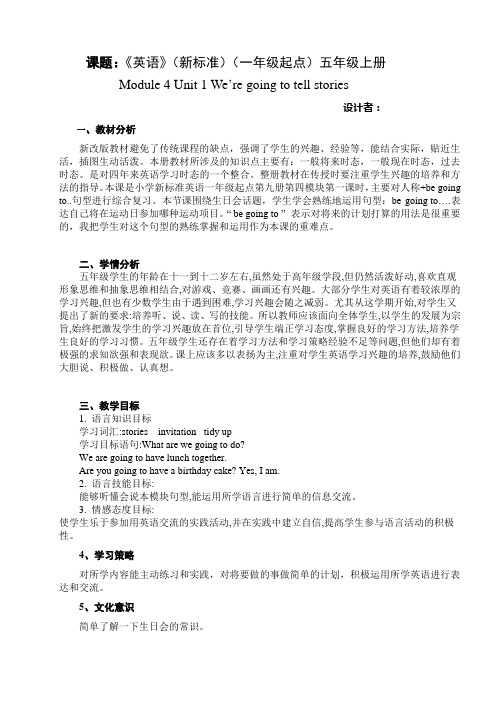
课题:《英语》(新标准)(一年级起点)五年级上册Module 4 Unit 1 We’re going to tell stories设计者:一、教材分析新改版教材避免了传统课程的缺点,强调了学生的兴趣、经验等,能结合实际,贴近生活,插图生动活泼。
本册教材所涉及的知识点主要有:一般将来时态,一般现在时态,过去时态。
是对四年来英语学习时态的一个整合。
整册教材在传授时要注重学生兴趣的培养和方法的指导。
本课是小学新标准英语一年级起点第九册第四模块第一课时,主要对人称+be going to..句型进行综合复习。
本节课围绕生日会话题,学生学会熟练地运用句型:be going to….表达自己将在运动日参加哪种运动项目。
“ be going to ” 表示对将来的计划打算的用法是很重要的,我把学生对这个句型的熟练掌握和运用作为本课的重难点。
二、学情分析五年级学生的年龄在十一到十二岁左右,虽然处于高年级学段,但仍然活泼好动,喜欢直观形象思维和抽象思维相结合,对游戏、竞赛、画画还有兴趣。
大部分学生对英语有着较浓厚的学习兴趣,但也有少数学生由于遇到困难,学习兴趣会随之减弱。
尤其从这学期开始,对学生又提出了新的要求:培养听、说、读、写的技能。
所以教师应该面向全体学生,以学生的发展为宗旨,始终把激发学生的学习兴趣放在首位,引导学生端正学习态度,掌握良好的学习方法,培养学生良好的学习习惯。
五年级学生还存在着学习方法和学习策略经验不足等问题,但他们却有着极强的求知欲强和表现欲。
课上应该多以表扬为主,注重对学生英语学习兴趣的培养,鼓励他们大胆说、积极做、认真想。
三、教学目标1. 语言知识目标学习词汇:stories invitation tidy up学习目标语句:What are we going to do?We are going to have lunch together.Are you going to have a birthday cake? Yes, I am.2. 语言技能目标:能够听懂会说本模块句型,能运用所学语言进行简单的信息交流。
M4U1复习教学文档
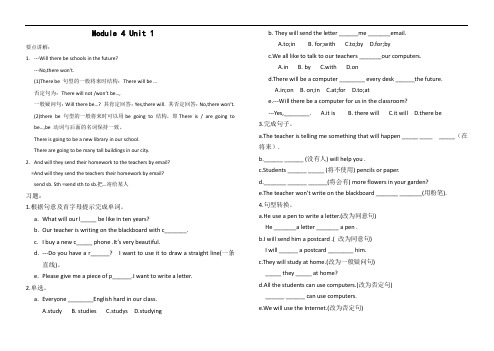
Module 4 Unit 1要点讲解:1.---Will there be schools in the future?---No,there won’t.(1)There be 句型的一般将来时结构:There will be …否定句为:There will not /won’t be…,一般疑问句:Will there be…? 其肯定回答:Yes,there will. 其否定回答:No,there won’t.(2)there be 句型的一般将来时可以用be going to 结构,即There is / are going tobe…,be 动词与后面的名词保持一致。
There is going to be a new library in our school.There are going to be many tall buildings in our city.2.And will they send their homework to the teachers by email?=And will they send the teachers their homework by email?send sb. Sth =send sth to sb.把…寄给某人习题:1.根据句意及首字母提示完成单词。
a.What will our l_____ be like in ten years?b.Our teacher is writing on the blackboard with c_______.c.I buy a new c_____ phone .It’s very beautiful.d.---Do you have a r______? I want to use it to draw a straight line(一条直线)。
e.Please give me a piece of p______.I want to write a letter.2.单选。
~~M4u1教案

“三段四环节五课型”教学模式M4 Unit 1 教学案例I’m making Daming’s birthday card.井沟镇实验小学马晓莉教案背景:本教案选自外研社新标准英语第八册四模块一单元一、教学目标:知识技能目标:1、现在进行时态和动词的现在分词仍然是本单元学习的主要内容;2.能理解掌握对话内容,用正确的语音语调朗读对话。
并用“Who can help me?”来寻求他人的帮助。
情感态度目标:通过小组合作及情景剧演示寻求别人的帮助,来培养学生集体合作精神和自主解决问题的能力。
学习策略目标:培养学生积极与他人合作,积极运用英语进行交流,在交流中发展语言的能力。
通过学习本课的句型,学会用“Who can help me?”来寻求他人的帮助。
二、教学重点难点:重点:现在进行时态和动词的现在分词的应用。
难点:如何表达来寻求别人的帮助。
三、教具准备:多媒体课件,,录音机四 .课时安排:一课时五.教学过程:(一)活跃气氛a.Free talkHello,boys and girls,I’m Miss Ma, nice to meet you。
I think today we’ll have an interesting class.b. Say a chant .:“What do you want to eat?”设计意图:(这是一首曲调琅琅上口的小chant,上课之初用来活跃气氛,继而开展本节课的教学。
)(二)、复习单词教学:•1、小组长带领读单词两遍,复习单词。
•2、组长听写,学生完成知识树的单词部分。
•3、由单词联想到一些短语,教师出示汉语,学生填英语。
(做学案1)(三)、自主学习,合作探究:Group work 1:小组合作学习:•1、小组长带领读单词两遍,复习单词。
•2、小组长听写,学生完成知识树的单词部分。
•3、由单词联想到一些短语,教师出示汉语,学生填英语。
(做学案1)Group work 2:小组合作学习:1、精读对话,划出重点短语和句子.(并写在知识树上)让你的知识树茂盛起来吧!2、再读对话,试着找出课文里尽量多的词形变化.(单复数 /三单/现分/过去式/同音词)(标注于知识树上) ※学习课文流程示意图※:★带问题听课文录音一遍→★再听一遍一找出课文里的现在分词→★找出课文大意 (完成学案2)→根据课文内容,做一个巩固判断题(完成学案3)→找短语和重点句型和词形变化(小组长带领在知识树上画出)→小组内讨论探究、解决疑难。
(完整版)M4U1重点单词讲解教学案
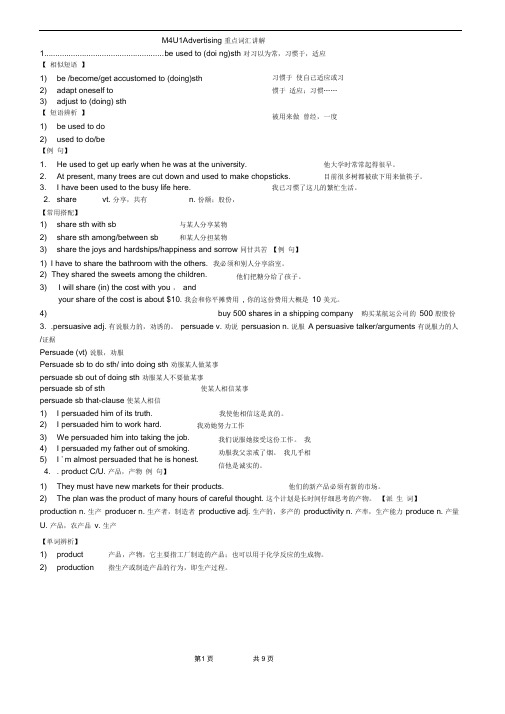
M4U1Advertising 重点词汇讲解1. ..................................................... b e used to (doi ng)sth 对 习以为常,习惯于,适应【 相似短语 】1) be /become/get accustomed to (doing)sth 2) adapt oneself to 3) adjust to (doing) sth【 短语辨析 】1) be used to do 2) used to do/be【例 句】1. He used to get up early when he was at the university. 他大学时常常起得很早。
2. At present, many trees are cut down and used to make chopsticks. 目前很多树都被砍下用来做筷子。
3. I have been used to the busy life here. 我已习惯了这儿的繁忙生活。
2. sharevt. 分享,共有n. 份额;股份,【常用搭配】1) share sth with sb与某人分享某物 2) share sth among/between sb和某人分担某物3) share the joys and hardships/happiness and sorrow 同甘共苦 【例 句】 1) I have to share the bathroom with the others. 2) They shared the sweets among the children. 3) I will share (in) the cost with you , andyour share of the cost is about $10. 我会和你平摊费用 , 你的这份费用大概是 10 美元。
Module4Unit1-1教案-

4.学习能力:鼓励学生在小组活动中积极合作、互帮互助,提高自主学习能力,形成有效的学习策略。
注意:以上核心素养目标与教材内容紧密关联,符合新教材要求,旨在全面提升学生的英语学科素养。
三、教学难点与重点
1.教学重点
-词汇在不同情境下的应用:学生需要学会如何根据语境选择合适的词汇来表达日常习惯。
举例:
-解释为什么在句子“ She always goes to school by bus.”中,动词“go”变为“goes”。
-对比“often”和“usually”的用法,如:“I often play sports on weekends.”与“I usually go to bed at10 p.m.”之间的区别。
四、教学流程
(一)导入新课
同学们,今天我们将要学习的是Module 4 Unit 1 -1的内容。在开始之前,我想先问大家一个问题:“你们在日常生活中是如何描述自己的日常习惯的?”例如,你通常早上做什么?这个问题与我们将要学习的一般现在时态密切相关。通过这个问题,我希望能够引起大家的兴趣和好奇心,让我们一同探索时态的奥秘。
-指导学生如何根据实际情况将句子中的时间状语替换,如:“What do you do in the morning?”可改为“What do you do after school?”。
-通过角色扮演等活动帮助学生理解词汇在不同情境下的运用,如谈论家庭成员的习惯时使用“Does your mother always cook dinner?”。
-重点词汇的用法:教授habit, usually, often, always, never等词汇在句子中的正确使用。
高中英语_Book4 Unit1复习课(第二课时)教学设计学情分析教材分析课后反思
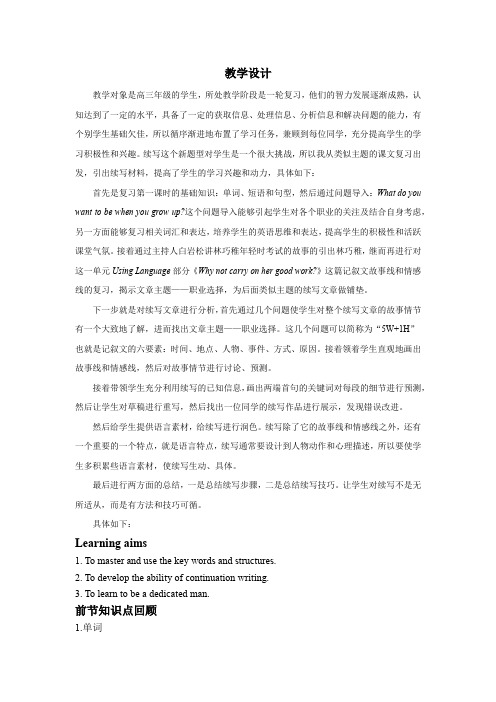
教学设计教学对象是高三年级的学生,所处教学阶段是一轮复习,他们的智力发展逐渐成熟,认知达到了一定的水平,具备了一定的获取信息、处理信息、分析信息和解决问题的能力,有个别学生基础欠佳,所以循序渐进地布置了学习任务,兼顾到每位同学,充分提高学生的学习积极性和兴趣。
续写这个新题型对学生是一个很大挑战,所以我从类似主题的课文复习出发,引出续写材料,提高了学生的学习兴趣和动力,具体如下:首先是复习第一课时的基础知识:单词、短语和句型,然后通过问题导入:What do you want to be when you grow up?这个问题导入能够引起学生对各个职业的关注及结合自身考虑,另一方面能够复习相关词汇和表达,培养学生的英语思维和表达,提高学生的积极性和活跃课堂气氛。
接着通过主持人白岩松讲林巧稚年轻时考试的故事的引出林巧稚,继而再进行对这一单元Using Language部分《Why not carry on her good work?》这篇记叙文故事线和情感线的复习,揭示文章主题——职业选择,为后面类似主题的续写文章做铺垫。
下一步就是对续写文章进行分析,首先通过几个问题使学生对整个续写文章的故事情节有一个大致地了解,进而找出文章主题——职业选择。
这几个问题可以简称为“5W+1H”也就是记叙文的六要素:时间、地点、人物、事件、方式、原因。
接着领着学生直观地画出故事线和情感线,然后对故事情节进行讨论、预测。
接着带领学生充分利用续写的已知信息,画出两端首句的关键词对每段的细节进行预测,然后让学生对草稿进行重写,然后找出一位同学的续写作品进行展示,发现错误改进。
然后给学生提供语言素材,给续写进行润色。
续写除了它的故事线和情感线之外,还有一个重要的一个特点,就是语言特点,续写通常要设计到人物动作和心理描述,所以要使学生多积累些语言素材,使续写生动、具体。
最后进行两方面的总结,一是总结续写步骤,二是总结续写技巧。
外研版八年级英语上册教案M4Unit1教案

外研版八年级英语上册教案M4Unit1教案学习很辛苦,但并不痛苦;学习没有什么捷径,苦学才是根本;在你没有找到“不用重复就可以学习好”的方法之前,请不放弃“重复”这种最简单、最有效的学习方法。
Module 4 Planes, ships and trains一、学习目标:A.单词和短语:road, accident, except, far, far away, crowded, choice, classmate, all the time, journey, book, outside, close, park, however, costB.交际用语:1. What happened?2. Don’t worry.3. —Who lives the closest to school?— Lingling lives closest.4. — What is the most comfortable way to go to school for Betty?— By taxi.5. —What’s the most expensive way to go to school?— Going by taxi is the most expensive.6. How do you get there?7. What’s the cheapest way?8. What’s the best way to get there?9. —What’s the cheapest way to travel from London to Paris?— The cheapest way is by coach.10. It’s the most comfortable way, but it’s the mos t expensive.11. He lives farthest from school.12. It is the fastest and the second cheapest.13. The more information, the better.二. 教学目标1. Function: Describing and comparing modes of transportation.2. Structure: Superlative adjectives and adverbs (-est, most); irregular superlatives.3. Skills: 1) Listening and understanding familiar topics (transportation)2) Comparing modes of transportation.3) Reading and finding specific transportation4) Writing a short passage comparing modes of transportation.4. Around the world: The longest railway5. Task: Making a holiday plan for a family trip to a city in China.三、重点及难点:Superlative adjectives and adverbs (-est, most); irregular superlatives.四、教学设计:Unit 1 He lives the farthest from school.ⅠTeaching modelListening and speakingⅡTeaching methodPWP approachⅢTeaching aims1. Key vocabulary: road, accident, except, far, far away, crowded, choice,classmate, close, all the time2. Key structures: superlative adjectives and adverbs (-est, most); irregularsuperlatives.3. Key sentences:1) What happened?2) Don’t worry.3) — Who lives the closest to school?— Lingling lives closest.4) — What is the most comfortable way to go to school for Betty?— By taxi.5) —What’s the most expensive way to go to school?— Going by taxi is the most expensive.ⅣTeaching aidsTape recorder, OHP, videoⅤTeaching StepsStep 1 Warming-up1. Work in pairs. Show some pictures and ask “How do you often go to school?”2. Look and say something about the pictures.3. Introduce the new words.4. Learn the new words.5. Read the new words.Step 2 Look and match.1. Ask the students to read the words in Activity 1.bus ship taxi train underground2. Look at the pictures in Activity 1 carefully.3. Now match the words with the pictures.5. Check the answers with the students.Keys: 1. train 2. ship 3. taxi 4. underground 5. busStep 3 Look, listen and match.1. Ask the students to read the words in Activity2.busy cheap expensivemodern2. Play the recording and ask the students to listen to the recording carefully. T: Listen and match the words in the box with the pictures in Activity 1. You need to use one word more than once.3. Check the answers with the students.Step 4 Listen and read.1. Show some pictures, and ask the students to talk about them.2. Ask the students to read the conversation silently.3. Play the recording and ask the students to listen the conversation, and then answer the questions.1) How does Lingling go to school? Why?2) How do you think Betty will go to school?4. Read the conversation.5. Act it out.Step 5 Complete the table.1. Ask the students to read the conversation again.2. Now complete the table.Betty Tony Lingling Daming Ways to goto school3. Check the answers.Keys: by bus (by bike) by underground walks / on foot by bus Step 6 Complete the sentences.1. Ask the students to read the words in the box in Activity 4.close comfortable goodfar2. Read the sentences.1) The _________________ way to go to school is by taxi.2) Tony lives the __________ from school.3) Lingling’s home is the _________ to school, so she always walks.4) For Betty, going to school by bike is the ______ choice.3. Complete the sentences with the correct words from the box.4. Check the answers:Keys: 1. most comfortable 2. farthest 3. closest 4. bestStep 7 Complete the sentences.1. Ask the students to read the words or expression in the box in Activity 5.accident crowded except mostmodern2. Read through the sentences.1) All the students take the bus to school ___________ Sam.2) The ___________ train in the world is the Shanghai airport train.3) I saw a(n) __________ on the way to school yesterday.4) I do not take the bus to school because it is usually very ___________.3. Complete the sentences with the correct words from the box.4. Check the answers:Keys: 1. except 2. most modern 3. accident 4. crowdedStep 8 Pronunciation and speaking.1. Play the recording once without stopping.2. Play the recording again and ask the whole class to repeat.1) —Who lives the closest to school?— Lingling lives closest.2) — What is the most comfortable way to go to school for Betty?— By taxi.3. Ask the students to listen and mark the intonation.4. Now listen again and repeat.Step 9 Work in pairs.1. Ask the students to read the words or expression in the box in Activity 7.2. Read the example with the class.—What’s the most expensive way to go to school?— Going by taxi is the most expensive.3. Work in pairs.Step 10 Language points1. Maybe I should go to school by taxi. 或许我应该坐出租车去上学。
M4U1复习教学案.doc
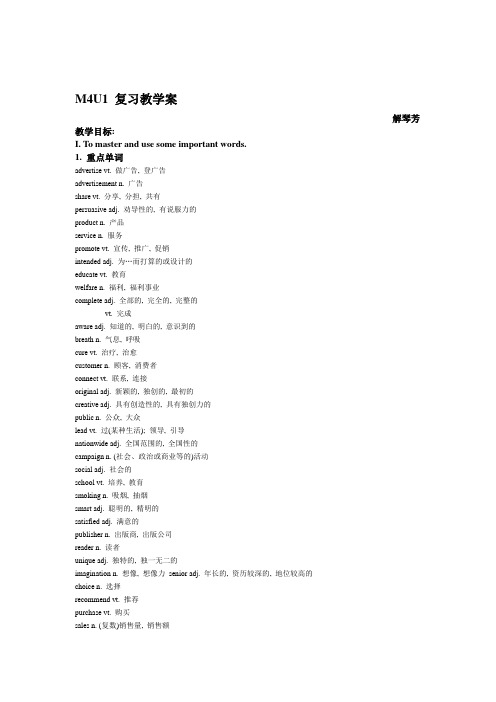
M4U1 复习教学案解琴芳教学目标:I. To master and use some important words.1. 重点单词advertise vt. 做广告, 登广告advertisement n. 广告share vt. 分享, 分担, 共有persuasive adj. 劝导性的, 有说服力的product n. 产品service n. 服务promote vt. 宣传, 推广, 促销intended adj. 为…而打算的或设计的educate vt. 教育welfare n. 福利, 福利事业complete adj. 全部的, 完全的, 完整的vt. 完成aware adj. 知道的, 明白的, 意识到的breath n. 气息, 呼吸cure vt. 治疗, 治愈customer n. 顾客, 消费者connect vt. 联系, 连接original adj. 新颖的, 独创的, 最初的creative adj. 具有创造性的, 具有独创力的public n. 公众, 大众lead vt. 过(某种生活); 领导, 引导nationwide adj. 全国范围的, 全国性的campaign n. (社会、政治或商业等的)活动social adj. 社会的school vt. 培养, 教育smoking n. 吸烟, 抽烟smart adj. 聪明的, 精明的satisfied adj. 满意的publisher n. 出版商, 出版公司reader n. 读者unique adj. 独特的, 独一无二的imagination n. 想像, 想像力senior adj. 年长的, 资历较深的, 地位较高的choice n. 选择recommend vt. 推荐purchase vt. 购买sales n. (复数)销售量, 销售额eye-catching adj. 引人注目的company n. 公司update vt. 更新old-fashioned adj. 老式的, 过时的design n. 设计, 图案, 花样vt. 设计feature n. 特色, 特点completely adv. 完全地, 彻底地unforgettable adj. 难忘的, 无法忘记的fashionable adj. 时髦的, 流行的convenient adj. 便利的, 方便的continuously adv. 连续地, 不间断地highly adv. 很, 非常; 高度地functional adj. 实用的, 有用的; 功能的bored adj. 感到厌倦的available adj. 可买到的, 可获得的various adj. 各种各样的, 多样的particular adj. 特定的, 特别的audience n. 受众, 观众, 听众target n. 目标, 对象, 靶子determine vt. 确定, 决定extremely adv. 非常, 极其appeal vi. 迎合, 有吸引力react vi. 做出反应, 回应gather vt. 收集, 搜集, 使聚集approach n. 方法, 途径2. 单词应用:A)词形转换1)intended ( adj.) ---- ( n .) 2)connect ( v. ) ----( n. ) 3)educate ( v. ) ---- ( n. ) (adj.)(adj.)4)advertiser ( n. )---- ( n. )(v.) 5)create ( v. ) ---- (adj.) (n.)6)society ( n. ) ---- ( adj.) 7)complete (adj./v.)---(adv.) 8)imagine ( v.)---- ( n.)(adj.)9)determine (v.)----__________( adj.) (n.)10)satisfied (adj.) ---- (v.) (n.)(adj.) B) 根据单词的首字母或汉语意思填写正确单词,注意形式变化1.If you want to sell this product well, I advise you to a_________ it in the newspaper or on TV.2.All of us finally agreed to his plan because of his p_______ language.3.Nearly all the a_______ to the palace were guarded by the soldiers.4.The writer traveled throughout the country to p_________ his latest novel.5.PSAs are often placed for free, and are i_______ to educate people about health, safety, or any other i_______ which affects public welfare.6.China has strong laws to protect people from advertisements that lie or try to make people believe u_______ claims about products or services.7.The advertisers want you to read the word ‘fights' and think that the toothpaste c______ bad breath, but it does not say that!8.PSAs use some of the same methods, like attractive and original images and c_____ language, but they are made to serve the public.9.China began a nationwide public service advertising c______ in 1996, and since then numerous PSAs have appeared around the country.10.One of the PSAs to teach us how to live healthy lives is ‘Smoking is ______ _______(自杀) slowly'.11.I have c_______(完成) my article about ads, and I'm quite ______ (满意) with it.12.Before our talk, I did not think very much about how an advertiser might be trying to t_______ customers into buying a product or a service.13.The publisher also said that the readers wouldn't believe the writer's u way of thinking and richi (想象力).14.This term's main reading category for senior high students is adventures, so Travel to the Misty Country would be a good c .15.That is why we are considering r_____________ (重新包装)our chocolate bar as well. 16.Our new packaging will be colorful and _____________ (引人注目).17.Have you ever (后悔) not having snapped those (难忘的) moments?18.It's (极其) important to know your audience so you can create the right message for the rightpeople.19.You must decide what a you want to use.II. To master some important phrases.1. 重点短语1)习惯做某事be /get used to doing 2)做些关于…的研究do some research on 3) 与…分享,合用share with4) 鼓励某人做某事encourage sb to do sth5) 信任某人believe in 6) 免费for free7) 为…打算/而设计be intended to do sth 8) 保护…免受…(伤害)protect sb from sth9) 公共福利public welfare 10) 认识到,意识到be aware of11) 即使even if 12) 为…骄傲be proud of 13) 与…有联系connect…to..14) 上…的当,受…的骗,对…信以为真fall for 15) 捉弄,欺骗play tricks on 16) 过更好的生活lead a better life 17) 过健康的生活live a healthy life 18) 自杀commit suicide 19) 听从建议follow the advice 20) 给某人提供某事offer sb sth 21) 对…满意be satisfied with22) 诱使某人做某事trick sb into doing sth 23) 反复地over and over again 24) 吸毒take drugs 25) 远离keep away from26) 以很低的价格at a low price27) 对…感到厌烦be tired of/ be bored with 28) 上市;打折出售on sale 29) 高质量的of high quality 30) 受…欢迎be popular with31) 提醒某人(不)做某事remind sb (not to) to sth 32) (数量、程度等)达到up to 33) 对…感到惊讶/惊奇be amazed at 34) 迎合,对…有吸引力appeal to35) 对…关心/关注/感兴趣be concerned with 36) 传达,被理解get sth. across to sb. 37) 让某人做某事get sb to do38) 以…为基础be based on 39) 从那以后since then40) 劝(服)某人做某事persuade sb into doing sth /persuade sb to do sth2. Fill in the blanks with the correct forms:1. We tried to _________ our point ________, but he just wouldn't listen.2. It is important to always try to the way the audience will react.3. My daughter me forget to take my medicine.4. The company must ensure that their product .5. If you math, you should turn to doing some English exercises.6. When you start a successful ad campaign, you must a clear goal and target audience . III. To review and master some important sentence structures.1. 句型结构1).We (如此习惯于) them that we often do not even realize how many we see and hear in a day. Wood can (被用来造纸).We (过去常购物) on Sundays, but now we have no time. 2) PSAs are often placed for free, and are intended to educate …be intended/meant to do sth./ be intended/meant for sb/sthThis software the computers (是为了保护…不受到…攻击而设计) by a kind of virus called worm.The toy ____ _______ ______ ______ (是给儿童玩的) aged three and up.3)However, we still must _____ _______ _______ (知道) the methods used in ads to try and sell us things.(老师说的话) made me _____ ____ (意识到英语的重要性).Are you aware (你已伤害了)her feelings? 4)We must not(上…的当) this kind of trick.He (很聪明不会中那个诡计的). 5) These ads deal with large issues.He is (容易相处).(尽管她病了), she continued (处理) be popular with, be of high quality, remind sb.(not) to do sth, be bored with, have sth. in mind, appeal to, get sth across, up toproblems of all kinds.6)There are even PSAs to teach us how to (过健康的生活).7)I will encourage (鼓励朋友们注意) them as well. 8)I recommend that(我们买) 10 copies for the library.= I recommend 10 copies for the library.He recommended me (呆) for another week.2. 翻译句子1) 他过去生活在农村,但现在已经完全适应城市生活了。
(完整版)M4U1复习教学案
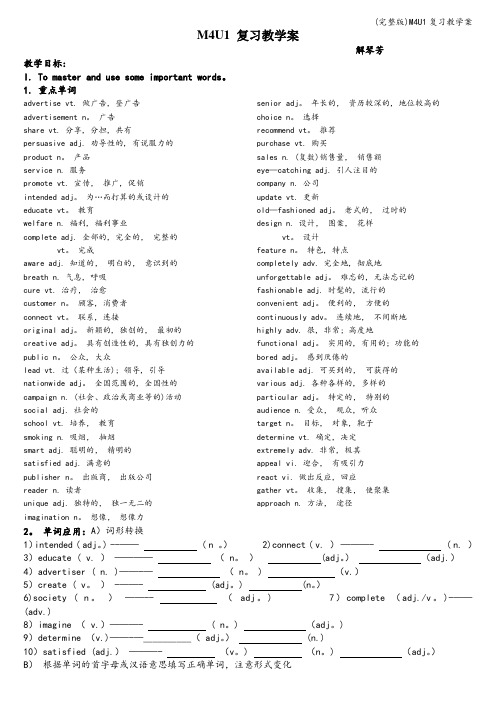
M4U1 复习教学案解琴芳教学目标:I. To master and use some important words。
1. 重点单词advertise vt. 做广告, 登广告advertisement n。
广告share vt. 分享, 分担, 共有persuasive adj. 劝导性的, 有说服力的product n。
产品service n. 服务promote vt. 宣传,推广, 促销intended adj。
为…而打算的或设计的educate vt。
教育welfare n. 福利, 福利事业complete adj. 全部的, 完全的,完整的vt。
完成aware adj. 知道的,明白的,意识到的breath n. 气息, 呼吸cure vt. 治疗,治愈customer n。
顾客, 消费者connect vt。
联系, 连接original adj。
新颖的, 独创的,最初的creative adj。
具有创造性的, 具有独创力的public n。
公众, 大众lead vt. 过(某种生活); 领导, 引导nationwide adj。
全国范围的, 全国性的campaign n. (社会、政治或商业等的)活动social adj. 社会的school vt. 培养,教育smoking n. 吸烟,抽烟smart adj. 聪明的,精明的satisfied adj. 满意的publisher n。
出版商,出版公司reader n. 读者unique adj. 独特的,独一无二的imagination n。
想像,想像力senior adj。
年长的,资历较深的, 地位较高的choice n。
选择recommend vt。
推荐purchase vt. 购买sales n. (复数)销售量,销售额eye—catching adj. 引人注目的company n. 公司update vt. 更新old—fashioned adj。
M4 U1教学设计新部编版

课前激趣,引发学生的积极思维,在不知不觉中为新课做铺垫。
Step One:
Revision
and lead in
Show some pictureandhave a free talkwiththe students abouttheir activities on Sunday.Then lead in the new structure andpractice.
复习巩固be going to,直接引出will do 也可表达将来时。在知识层面起到承上启下的作用。
教学重点
Vocabulary andthe simple future tense(will + do).
教学难点
They can use thesimple future tenseto express their ideas exactly.
教
学
方
法
Communicative method and task-based teaching approach.
对课上所学语言知识加深巩固,拓展语言表达能力。
发挥学生的想象力和创造力,提高语言的综合运用能力。
板书设计
Module 4Life in the future
Unit 1Everyone will study at home.
S + will do+ others some phrases
专题25 八上M4U1 复习学案2021年中考一轮复习提升学案及训练题(外研版)

专题25 八上M4U1 2021年中考一轮复习学案(外研版)一、学习目标:1.通过复习巩固词汇,能掌握重点词汇及其词形变化;2.能够掌握形容词和副词最高级的规则变化;3.通过复习巩固短语和句型,能补全重点句子,并进行句子仿写;4.通过复习巩固语言点和重点句子,掌握本单元的重点知识点,happen、except、besides及交通工具的表达方式;5.能够根据思维导图和相关提示,复写本单元的课文。
二、基础知识梳理与巩固I. 快速默写出下列单词短语。
Score: __________分1. n. 路;(尤指)公路________2. n. 交通事故;意外事故________3. prep. 除……之外________4. n. 选择________5. n. 同班同学________6. adj. & adv. 远;遥远(的)________7. adj. 近的adv. 接近的________8. adj. 拥挤的;人数过多的________Ⅱ. 词性拓展:写出下列词汇的词形变化Score: __________分【学法指导】1.自测2.纠错3.二次记忆1.choice (n.) 选择________ (v.) 选择2. far(adj./adv.) 远的;遥远的________ 比较级________最高级________ 反义词3. close(adj.) (距离上)近的,接近的________同义词________反义词4. worst(adj. / adv. )最差的(地);最坏的(地)(原级)________adj.坏的;不好的________adv. 坏地;不好地________反义词5. crowded(adj.) 拥挤的;人数过多的__ _______n. 人群________不拥挤的;宽敞的6. comfortable(adj.) 舒服的;愉快的________反义词________adv.Ⅲ. 默读课文,写出下列短语和句子:(独立完成)Score: __________分1.背诵短语句子2.自测3.纠错4.二次记忆1. 除了_________________________2. 远离____________________3. 做···迟到了_________________4. 交通事故______________________5. 最舒适的方式_________________6. 交通拥挤____________________7. 一直;不断地_________________ 8. 乘地铁_____________________9. 离···近_____________________ 10. 与···相同___________________11.今天我上学迟到了。
小学英语_M4U1教学设计学情分析教材分析课后反思

英语学科四年级下册M4U1<Will you take your kite? >教学设计教学目标(一)语言知识目标:1.能够听说、认读“take/picnic/great/why/because/so/fly”等单词。
2.能够用句型“Will you take……?”来询问他人并用“Yes, I will / No, I won’t. ”作出肯定或否定回答。
(二)语言技能目标:1.学生能够口头表达并运用“take/picnic/great/why/because/so/fly”2.学生能用所学句型:“Will you take……?Yes, I will / No, I won’t. ”进行对话交流。
3.学生在掌握本节课“Will you take... ”句型的基础上,进而能用句型“Will you... ”询问他人的计划并会相应的回答。
(三)情感态度目标:从主人公一家和谐幸福的家庭气氛牵引到学生自身,激发学生的幸福感和满足感,并通过拓展故事渗透勇于追逐梦想,不断努力的观念。
(四)学习策略目标1.通过观看课文动画,感知对话内容,学会捕捉文中重要信息的听力技巧,并能根据课文信息推理出一定的逻辑关系。
(如由课本图片中隐藏的日历信息推理出明天是周五。
)2.通过角色扮演、自由对话等英语实践活动,增强对所学英语知识的体验,形成正确的交际策略,提高英语运用能力。
教学重难点:(一)重点:灵活使用“Will you take……?Yes, I will . / No, I won’t”询问他人的计划及作出肯定与否定回答。
(二)难点:灵活掌握并熟练运用词汇“take,because, why, picnic”等单词和“Will you take... ”句型的问答;理解课文中Amy 说“No, I won’t. ”的矛盾点所在。
课前准备:课件,单词卡课前活动:I say you do./I do you say. /“Simon says”游戏。
- 1、下载文档前请自行甄别文档内容的完整性,平台不提供额外的编辑、内容补充、找答案等附加服务。
- 2、"仅部分预览"的文档,不可在线预览部分如存在完整性等问题,可反馈申请退款(可完整预览的文档不适用该条件!)。
- 3、如文档侵犯您的权益,请联系客服反馈,我们会尽快为您处理(人工客服工作时间:9:00-18:30)。
Module4 Unit 1 Advertising 一.必背词汇1.advertisement2.persuasive3.skilful4.innocent5.promote6.cheatment8.mental9.nationwide10.campaign11.intelligenceprehension13.consult 14.multiply15.recommend16.purchase17.eye-catching18.update19.aspect20.bargain21.bonus22.fancy23.medium24.target25.appeal二.词形转换1.persuade→ ___________ n.→ _________ adj.2.skilful →_____ n.3.fool → ______ adj.4.benefit→ __________ adj.5.recommend→ ________________ n.6.design→ _________ adj. n7.determine→ __________ adj.→ ______________ n.8.ana lysis → _____________ vt.9.shock→ ____________ adj.→ ____________ adj.10.advertising→v.→ ___________ n.11.intelligence→adj.12.consult→n.13.react→n.14.personally→adj.15. promote n.16. innocent n.17. breath→v.18. poisonous n.四、常用短语*1.be_meant_to旨在,目的是*2.fall_for 上……当,受……的骗;爱上*3.play_tricks_on 欺骗;捉弄*4.deal_with 涉及,关于;处理,应付5.end_with 以……结束6.up_to (数量、程度等)达到*7.figure_out 弄清楚,弄懂;计算出*8.appeal_to 吸引,引起兴趣;呼吁9.be_concerned_with 对……关心*10.get_sth.across 把……表达清楚11.put_sth.together 组织,汇集;组装12.die_from 死于……13.even_if/though 虽然,即使14.for_free 免费15.fool_sb._into_doing_sth. 欺骗某人做某事16. make sb aware of 使某人意识到…17. when it comes to…当提到…的时候18. go on the market 上市19. be bored with 对…厌烦20. discourage sb from doing 劝阻某人做某事1.The computer is too old and has to be ________________.2.The resort is attractive, and is easily ________________ by road, rail or air.3.It’s important to ________________ between business and pleasure.4.This chapter _______________________ the mental health of older people.5.After about half an hour, the firefighters ___________________ the fire which broke out inthe chemical factory.6.These normally harmless substances can _______________ to form a highly poisonous gas.7.His time is ________________ with his business. As a result, he spends little time with hisonly son,8.Rose is made national flower by American because it ________________ beauty and love.9.Here are two highways ________________ the capital city, and you can take either.10.The campaign is intended to ________________ people’s awareness of saving water.M4 Unit1 重点句型和练习1.Even_if an ad does not lie, it does not mean it is altogether innocent.即使一则广告没有撒谎,也并不意味着这则广告就是完全清白的。
even if意为“尽管,即使”,用来引导让步状语从句,even if可用even though替换。
①I like her, even though she can be annoying at times.尽管她有时可能很烦人,我还是喜欢她。
②He will come on time even_if_it_rains.即使下雨,他还是会准时来的。
[名师指津]如果整个句子意指将来,even if从句中的谓语动词须用一般现在时代替将来时。
[链接高考](2012·北京高考)—Look at those clouds!—Don't worry.________ it rains, we'll still have a great time.A.Even if B.As though C.In case D.If only2.There are even PSAs to teach us how to live healthy lives.甚至还有一些公益广告教我们如何健康地生活。
how to live healthy lives属于“疑问词+不定式”结构,作teach 的直接宾语。
“疑问词+不定式”结构的用法:(1)疑问词包括疑问代词(who, what, which)和疑问副词(when, where, how)。
此结构可作主语、宾语、表语等。
①Where to hold the meeting hasn't been decided.还没决定在哪里举行会议。
(2)“疑问词+不定式”结构可转换为从句。
②The boy is too young to know what_to_do in trouble.=The boy is too young to know what he should do in trouble.孩子太小,不知道在困境中该做什么。
[链接高考](2010·辽宁高考)—It's no use having ideas only.—Don't worry. Peter can show you ________ to turn an idea into an act.A.how B.who C.what D.where3.According to the publisher, readers do seem to be interested in this new novel.根据出版商的说法,读者的确好像是对这本新小说很感兴趣。
do“的确,确实”,用在谓语动词之前,起强调作用。
其用法特点:(1)只能用“do/does/did+动词原形”,没有别的形式;(2)只能用于一般现在时和一般过去时的肯定句中。
①People do believe that she is honest.大家确实相信她是诚实的。
②He did_go abroad, which was unexpected.他的确出国了,这让大家感到很意外。
[名师指津]在肯定句的祈使句中,句首的do 用来加强语气,可译成“务必,一定要,千万”。
③Do write to me when you get there.你到那儿后务必给我来信。
[链接高考](2010·四川高考)If you have a job, ________ yourself to it and finally you'll succeed.A.do devote B.don't devote C.devoting D.not devoting[句型对点集训]Ⅰ.句型转换1.I hardly know what I should say before you.→I hardly know _______ ________ __________ before you.2.He wrote to his mother last week.(强调谓语动词)→He ______ _ ________ to his mother last week.单选练习1.—What do you think of the film Titanic?—Moving, and the theme song My heart w ill go on really ________me.A.appeals to B.attends to C.belongs to D.refers to2.China has been pushing the reform of public hospitals ________ all its citizens.A.in charge of B.for the purpose of C.in honor of D.for the benefit of3.It's important for the figures________regularly.A.to be updated B.to have been updatedC.to update D.to have updated4.Ad-makers choose words and brand names very carefully in order to make a creative image of the product they are ________.A.processing B.producing C.providing D.promoting5.I have tried everything I can ________ him to stay, but he didn't listen to me.A.persuade B.persuading C.to be persuaded D.to persuade6.I strongly recommend that the information ________ in my report ________ to Professor Keller without delay.A.to be referred to; to be e-mailed B.referring to; e-mailC.referred to; be e-mailed D.being referred to; being e-mailed7.—What's wrong with you? You look worried.—Oh, I am wondering how I can ________ my idea to the little children.A.get across B.show off C.hold back D.work out8.Arthur, you ________ because I have no father or mother that I am alone in the world, and that you can treat me as you choose!A.frustrate B.foresee C.fancy D.found9.—You should have told her about the meaning of the gesture.—I meant ________,but I had some unexpected guests.A.to do B.to have C.doing D.doing so10.I have already put away a bit of savings since I made a ________.A.bargain B.budget C.currency D.charge11.________ we saw her pick up the money, we still can't be sure she stole it.A.Even if B.As if C.Now that D.Only if12.The problem was easy so it didn't take much time for the children to ________ the correct answer.A.make up B.figure out C.look through D.put off。
